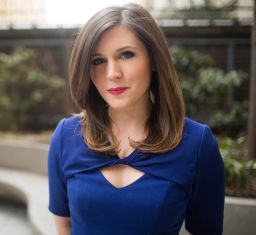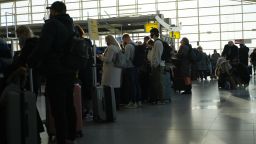Editor’s Note: Jill Filipovic is a journalist based in New York and author of the book, “OK Boomer, Let’s Talk: How My Generation Got Left Behind.” Follow her on Twitter. The opinions expressed in this commentary are solely her own. View more opinion articles on CNN.
Holiday travelers may be facing a less-than-merry trip this year: Airlines canceled more than 1,000 flights within, into and out of the United States on Monday largely because of sick staff members and winter weather. Internationally, European carriers are also slashing their scheduled flights this winter in part due to lighter bookings.

This wave of cancellations is frustrating to be sure. But it’s also to be expected in the time of Covid-19, when so much is unpredictable, and particularly during Covid-19 infection surges. Right now, the US and many other nations are feeling the impact of the highly contagious Omicron coronavirus variant, and some industries are being hit harder than others – particularly those that, like airlines, put millions of people from all over the world in close contact.
But even with now-predictable Covid-related disruptions, cancellations of this magnitude were not wholly inevitable. They are likely happening in part because the US is still without the common-sense travel rules that would keep airline staff and travelers as safe as possible.
As it stands, any American can get on a flight into or within the US without being vaccinated. While vaccinated people can still contract and spread Covid-19, the vaccines are effective at preventing many infections and therefore reducing the spread of disease. In contrast, unvaccinated people who have no immunity to the virus are highly susceptible to Covid-19.
As a result of this significant difference in risks posed by the unvaccinated compared to the vaccinated, we require non-US citizens who are flying into the US to provide proof of vaccination. A different standard, though, applies to Americans, who can fly to and within the US without ever having to present a vaccine card. That should change, and many health experts agree.
Dr. Anthony Fauci told MSNBC that it’s “reasonable to consider” a vaccine requirement for domestic flights. And in an interview with CNN, epidemiologist Ali Mokdad said about vaccine and testing requirements for domestic flights, “In Seattle where I live, I can’t go to a restaurant unless I prove I’m vaccinated or have a negative test. And if you don’t want to get vaccinated, … get a negative test 24 hours before you get onto the plane. I mean, do it exactly like we are doing for international travel.”
Mokdad is right. These requirements would help to curb the viral spread that has so many airline and airport employees out of work and so many flights unable to operate.
Testing requirements would also help. International travelers have to provide a negative Covid-19 test taken within one calendar day of travel under new testing rules implemented because of Omicron. But domestic travelers don’t have to show anything – they simply have to wear masks.
It’s an odd rule, given that, on average, infection rates within the US are much, much higher than in many other countries, and the US is so vast that Covid-19 rates can vary widely from region to region, making areas of low case rates vulnerable to surges imported from other parts of the nation.
Yet, we treat anyone coming in from abroad as a potential vector, while not requiring people within our own high-risk country to show they do not have an active Covid-19 infection or any protection against one before getting into an enclosed box of shared (albeit well-filtered) air.
All of that said, even with stricter requirements, travel disruptions may still occur. It’s inconvenient, but it’s also an understood cost of traveling in this strange era. Anyone who travels abroad, for instance, knows that they run the risk of testing positive before flying home, forcing them to quarantine in place. And anyone who was paying even a small amount of attention to the pre-holiday Omicron rise had to know that the future was unpredictable – and that the only thing that one could certainly predict was that disruptions would occur.
Anyone who got on an airplane before Christmas should have understood that a universe of less-than-ideal possibilities were on the table, from border closures to flight cancellations.
Get our free weekly newsletter
Thanks to highly effective vaccines, testing options and airplane mask mandates, it was finally possible to travel responsibly this holiday season, and millions of people took advantage of that opportunity, including me (and many of the unvaccinated and untested traveled irresponsibly, which is part of the reason we’re now in this mess).
After nearly two years of a pandemic, many of us were craving time with our loved ones and a little taste of the freedoms and pleasures that we’ve forgone for too long. But this is another iteration of the same lesson we don’t seem to have learned from Covid-19: Fighting this illness requires a collective effort, but because so many Americans don’t see it that way, it also requires reasonable rules to keep everyone safe. If we want to keep or even expand on the handful of freedoms we’ve regained – not to mention keep our economy afloat and prevent unnecessary deaths – then we need targeted rules for travel and other inessential activities.
Many of us who were thrilled to see family, friends and loved ones over the holidays are now facing the frustration of a return home in limbo. Some of that was to be expected. But some of it is maddeningly unnecessary – the sign of a profound policy failure, and a fixable one.





